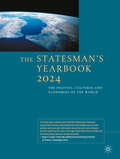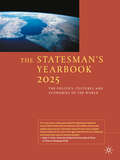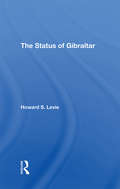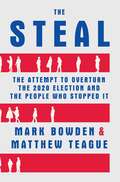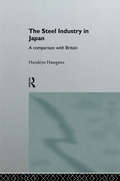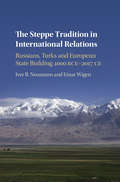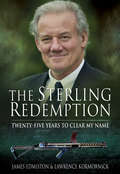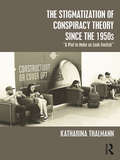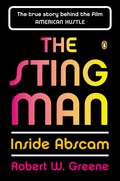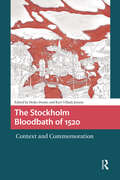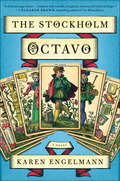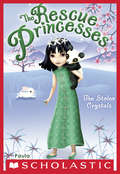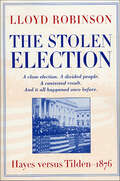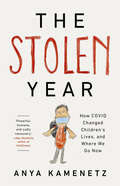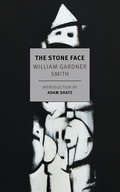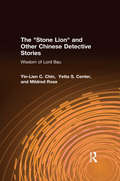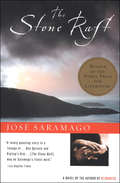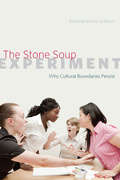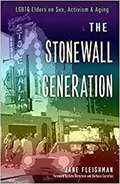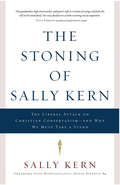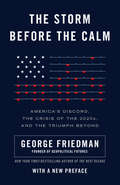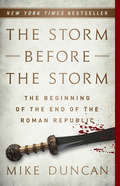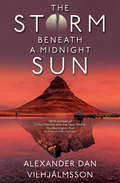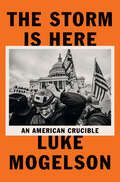- Table View
- List View
The Statesman's Yearbook 2024: The Politics, Cultures and Economies of the World (The Statesman's Yearbook)
by Springer Nature Limited Published annually since 1864Now in its 159th edition, The Statesman's Yearbook continues to be the reference work of choice for accurate and reliable information on every country in the world. Covering political, economic, social and cultural aspects, the Yearbook is also available online for subscribing institutions.
The Statesman's Yearbook 2025: The Politics, Cultures and Economies of the World (The Statesman's Yearbook)
by Springer Nature Limited Published annually since 1864Now in its 61st edition, The Statesman's Yearbook continues to be the reference work of choice for accurate and reliable information on every country in the world. Covering political, economic, social and cultural aspects, the Yearbook is also available online for subscribing institutions.
The Status Of Gibraltar
by Howard S LevieTwo aphorisms are often stated about Gibraltar: first, that it was a possession that "Spain did not value until she had lost it"; and second, since the day it became a British possession, "Gibraltar has been a thorn in the side of Spain." Except for a few relatively short periods, the Gibraltar issue has adversely affected Anglo-Spanish relations during the almost 275 years of British ownership. To date, negotiations under the aegis of the United Nations have proven unfruitful. Spain demands that complete sovereignty be returned. Great Britain declines to take any such action without the consent of the inhabitants. Despite a referendum in which the Gibraltarians voted overwhelmingly to retain links with Great Britain, the Special Committee of the U.N. General Assembly continues to strongly support the Spanish claim. What effect Spain's entry into NATO will have remains to be seen. This book examines the historical background and present status of the dispute, making extensive use of documents not previously analyzed in depth. Dr. Levie describes the events leading up to the Treaty of Utrecht, provides a detailed analysis of the treaty itself, and traces the origins of its various interpretations. He discusses how the British, unintentionally or otherwise, have violated its provisions, and how the Spanish have attempted to retaliate. The book concludes with a discussion of how the Gibraltar issue has beeen handled in the U.N. to the present day.
The Steal: The Attempt to Overturn the 2020 Election and the People Who Stopped It
by Mark Bowden Matthew Teague“A gripping ground-level narrative…a marvel of reporting: tightly wound… but also panoramic.”—Washington Post <p><p> “A lean, fast-paced and important account of the chaotic final weeks.”—New York Times <p><p> In The Steal, veteran journalists Mark Bowden and Matthew Teague offer a week-by-week, state-by-state account of the effort to overturn the 2020 presidential election. <p><p> In the sixty-four days between November 3 and January 6, President Donald Trump and his allies fought to reverse the outcome of the vote. Focusing on six states—Arizona, Georgia, Michigan, Nevada, Pennsylvania, and Wisconsin—Trump’s supporters claimed widespread voter fraud. <p><p> Caught up in this effort were scores of activists, lawyers, judges, and state and local officials. Working with a team of researchers and reporters, Bowden and Teague uncover never-before-told accounts from the election officials fighting to do their jobs amid outlandish claims and threats to themselves, their colleagues, and their families. The Steal is an engaging, in-depth report on what happened during those crucial nine weeks and a portrait of the dedicated individuals who did their duty and stood firm against the unprecedented, sustained attack on our election system and ensured that every legal vote was counted and that the will of the people prevailed.
The Steel Industry in Japan: A Comparison with Britain (The University of Sheffield/Routledge Japanese Studies Series)
by Harukiyo HasegawaFirst published in 2004. Routledge is an imprint of Taylor & Francis, an informa company.
The Steppe Tradition in International Relations: Russians, Turks and European State Building 4000 BCE–2017 CE
by Iver B. Neumann Einar WigenNeumann and Wigen counter Euro-centrism in the study of international relations by providing a full account of political organisation in the Eurasian steppe from the fourth millennium BCE up until the present day. Drawing on a wide range of archaeological and historical secondary sources, alongside social theory, they discuss the pre-history, history and effect of what they name the 'steppe tradition'. Writing from an International Relations perspective, the authors give a full treatment of the steppe tradition's role in early European state formation, as well as explaining how politics in states like Turkey and Russia can be understood as hybridising the steppe tradition with an increasingly dominant European tradition. They show how the steppe tradition's ideas of political leadership, legitimacy and concepts of succession politics can help us to understand the policies and behaviour of such leaders as Putin in Russia and Erdogan in Turkey.
The Sterling Redemption: Twenty-Five Years to Clear My Name
by James Edmiston Lawrence KormornickThe fight against a false accusation in the Arms-to-Iraq affair. &“A searing expose of one of the most shameful and cynical prosecutions of modern times.&” —The Guardian This is the untold true story of James Edmiston who suffered an extraordinary miscarriage of justice in 1983 when senior officials blocked vital witnesses coming to his trial which led to a personal tragedy; a broken marriage, and the loss of a business. The book explains how he was wrongly charged with alleged illegal exports to Iraq, and then took on the establishment against seemingly impossible odds for twenty-five years, to establish his innocence and to win record compensation from the British government in a truly remarkable case. Divorced and bankrupted, he is now rebuilding a shattered life, nearly thirty years later. This extraordinary story is a fascinating insight into government and the abuse of power and is based on many original sources including the Scott Report and Judgment of the Court of Appeal (criminal). The co-author, Lawrence Kormornick, is a Solicitor-Advocate (civil) who has represented Edmiston and several other victims of the Arms-to-Iraq prosecution scandal against the government and has a unique insight into these cases. Packed with ironies, twists of fate, and many unanswered questions it is a compelling read for anyone interested in political intrigue and abuse of power, miscarriage of justice, and learning about how an individual took on the state and won. &“A true story of alleged skulduggery and, possibly, criminal acts in the form of perverting the course of justice by the authorities and it should be bedside reading for everybody who believes in the rule of law.&” —The Law Society Gazette
The Stigmatization of Conspiracy Theory since the 1950s: "A Plot to Make us Look Foolish" (Conspiracy Theories)
by Katharina ThalmannAre conspiracy theories everywhere and is everyone a conspiracy theorist? This ground-breaking study challenges some of the widely shared assessments in the scholarship about a perceived mainstreaming of conspiracy theory. It claims that conspiracy theory underwent a significant shift in status in the mid-20th century and has since then become highly visible as an object of concern in public debates. Providing an in-depth analysis of academic and media discourses, Katharina Thalmann is the first scholar to systematically trace the history and process of the delegitimization of conspiracy theory. By reading a wide range of conspiracist accounts about three central events in American history from the 1950s to 1970s – the Great Red Scare, the Kennedy assassination, and the Watergate scandal – Thalmann shows that a veritable conspiracist subculture emerged in the 1970s as conspiracy theories were pushed out of the legitimate marketplace of ideas and conspiracy theory became a commodity not unlike pornography: alluring in its illegitimacy, commonsensical, and highly profitable. This will be of interest to scholars and researchers interested in American history, culture and subcultures, as well, of course, to those fascinated by conspiracies.
The Sting Man
by Robert W. GreeneSoon to be a major motion picture starring Christian Bale, Bradley Cooper, Amy Adams, and Jennifer Lawrence American Hustle is the amazing inside story of Mel Weinberg, one of the most fascinating fast-buck operators to ever live, and the incredible scandals he masterminded. Hustling his way from the streets of the Bronx to hawking bogus businesses around the world, Weinberg netted millions and famously dreamed up Abscam-the infamous FBI-run sting operation of the late 1970’s that would bag seven congressmen and one U. S. senator. .
The Stock of Intangible Capital in Canada: Evidence from the Aggregate Value of Securities
by Nazim BelhocineA report from the International Monetary Fund.
The Stockholm Bloodbath of 1520: Context and Commemoration (Crossing Boundaries: Turku Medieval and Early Modern Studies)
by Kurt Villads Jensen Heiko DrosteThe Stockholm Bloodbath on November 7–9, 1520, during which Kristian II had more than 100 persons executed on charges of heresy, is a turning point in the history of the Northern kingdoms. This bloodbath eventually led to Kristian II’s lifelong incarceration, the rise of the Swedish Vasa dynasty, and the end of the Kalmar Union. It has commonly been perceived both as part of Swedish-Danish conflict and also as part of a Swedish civil war. In this volume, fifteen researchers offer new insights both into the events themselves and also, most significantly, into their background and aftermath, which stretch far beyond Stockholm and the year 1520.
The Stockholm Octavo: A Novel
by Karen Engelmann“A delicious page-turner that brings eighteenth-century Stockholm to vivid life, complete with scandal, conspiracy, mystery, and a hint of magic.” —Eleanor Brown, New York Times–bestselling authorOne man’s fortune holds the key to a nation’s fate in this sensational debut novel set in eighteenth-century Sweden.The Stockholm Octavo by Karen Engelmann transports readers to a colorful Scandinavian world of intrigue and magic in a dazzling golden age of high art, music, and opulent fashion.A masterwork of historical fiction in the vein of Patrick Suskind’s classic novel, Perfume, The Stockholm Octavo is mysterious and romantic—as magical and enthralling as The Night Circus by Erin Morgenstern—and features a brilliant and unforgettable cast of extraordinary characters.“A juicy page-turner . . . Engelmann’s intellectually playful take on the mathematics of love and power proves irresistible.” —O, The Oprah Magazine“Neatly mixing revolutionary politics with the erotic tension and cutthroat rivalry of the female conspirators . . . Engelmann has crafted a magnificent, suspenseful story set against the vibrant society of Sweden’s zenith, with a cast of colorful characters balanced at a crux of history.” —Publishers Weekly (starred review)“Delicious . . . the essence of witty intelligence . . . The plot is an urgent one, and the characters mysterious, appealing, and memorable.” —Sena Jeter Naslund, New York Times–bestselling author “If you like novels that work on many levels at once, read this stunning tessellation of a book, where fortune is the flip side of intrigue and where history is the flip side of chance.” —Charlotte Rogan, national bestselling author
The Stolen Crystals: The Stolen Crystals (The Rescue Princesses #4)
by Paula HarrisonThese are no ordinary princesses . . . they're Rescue Princesses!Princesses to the rescue! Another animal is in trouble and the Rescue Princesses must save the day.Princess Jaminta lives in the beautiful Kingdom of Onica. She and her fellow princesses have discovered that someone is out to steal one of the kingdom's greatest treasures, and might harm a baby panda in the process. The Rescue Princesses must leap into action!
The Stolen Election: Hayes versus Tilden—1876
by Lloyd RobinsonA screamingly close presidential election. Allegations of fraud. Democrats and republicans, North and South, black and white--all at loggerheads.With each passing day, the conflict becomes more complex. Hard-eyed political operatives from both parties rush south to fight on every front. "Spin" is everywhere, the truth hardly to be found. From coast to coast, Americans alternate between anger, astonishment and despair.One candidate got more popular votes. But he will ultimately be defeated by an astonishing sequence of events--culminating in the tie-breaking vote of a single Justice of the United States Supreme Court.It's not the year 2000. It's 1876.It's the election that ended the Civil War--and set the stage for eighty bitter years of segregation in the South. We live in its shadow still.Read the full story. You'll never look at American politics the same way again.At the Publisher's request, this title is being sold without Digital Rights Management Software (DRM) applied.
The Stolen Year: How COVID Changed Children's Lives, and Where We Go Now
by Anya KamenetzAn NPR education reporter shows how the pandemic disrupted children&’s lives—and how our country has nearly always failed to put our children first The onset of COVID broke a 150-year social contract between America and its children. Tens of millions of students lost what little support they had from the government—not just school but food, heat, and physical and emotional safety. The cost was enormous. But this crisis began much earlier than 2020. In The Stolen Year, Anya Kamenetz exposes a long-running indifference to the plight of children and families in American life and calls for a reckoning. She follows families across the country as they live through the pandemic, facing loss and resilience: a boy with autism in San Francisco who gains a foster brother and a Hispanic family in Texas that loses a member to COVID, and finds solace when they need it most. Kamenetz also recounts the history that brought us to this point: how we thrust children and caregivers into poverty, how we over-police families of color, how we rely on mothers instead of infrastructure. And how our government, in failing to support our children through this tumultuous time, has stolen years of their lives.
The Stone Face
by William Gardner SmithA roman à clef about racism, identity, and bohemian living amidst the tensions and violence of Algerian War-era France, and one of the earliest published accounts of the Paris massacre of 1961.As a teenager, Simeon Brown lost an eye in a racist attack, and this young African American journalist has lived in his native Philadelphia in a state of agonizing tension ever since. After a violent encounter with white sailors, Simeon makes up his mind to move to Paris, known as a safe haven for black artists and intellectuals, and before long he is under the spell of the City of Light, where he can do as he likes and go where he pleases without fear. Through Babe, another black American émigré, he makes new friends, and soon he has fallen in love with a Polish actress who is a concentration camp survivor. At the same time, however, Simeon begins to suspect that Paris is hardly the racial wonderland he imagined: The French government is struggling to suppress the revolution in Algeria, and Algerians are regularly stopped and searched, beaten, and arrested by the French police, while much worse is to come, it will turn out, in response to the protest march of October 1961. Through his friendship with Hossein, an Algerian radical, Simeon realizes that he can no longer remain a passive spectator to French injustice. He must decide where his true loyalties lie.
The Stone Lion and Other Chinese Detective Stories: Wisdom of Lord Bau
by Yin-Lien C. ChinPresents ten tales featuring Lord Bau, a wise judge who was a champion of righteousness and protector of the weak against the powerful.
The Stone Raft
by José SaramagoA &“marvelously amusing&” political fable in which part of the European continent breaks off and drifts away on its own (Publishers Weekly, starred review). A Nobel Prize winner who has been called &“the García Márquez of Portugal&” (New Statesman) chronicles world events on a human scale in this exhilarating allegorical novel. One day, quite inexplicably, the Iberian Peninsula simply breaks free from the European continent and begins to drift as if it were a sort of stone raft. Panic ensues as residents and tourists attempt to escape, while crowds gather on cliffs to watch the newly formed island sail off into the sea. Meanwhile, five people on the island are drawn together—first by a string of surreal events and then by love. Taking to the road to explore the limits of their now finite land, they find themselves adrift in a world made new by this radical shift in perspective. As bureaucrats ponder what to do about their unusual predicament, the intertwined lives of these five strangers are clarified and forever changed by a physical, spiritual, and sexual voyage to an unknown destination. At once an epic adventure and a profound fable about the state of the European project, The Stone Raft is a &“hauntingly lyrical narrative with political, social, and moral underpinnings&” (Booklist) that &“may be Saramago&’s finest work&” (Los Angeles Times). Translated from the Portuguese by Giovanni Pontiero
The Stone Soup Experiment: Why Cultural Boundaries Persist
by Deborah Downing WilsonThe Stone Soup Experiment is a remarkable story of cultural difference, of in-groups, out-groups, and how quickly and strongly the lines between them are drawn. It is also a story about simulation and reality, and how quickly the lines between them can be dismantled. In a compulsively readable account, Deborah Downing Wilson details a ten-week project in which forty university students were split into two different simulated cultures: the carefree Stoners, and the market-driven Traders. Through their eyes we are granted intimate access to the very foundations of human society: how group identities are formed and what happens when opposing ones come into contact. The experience of the Stoners and Traders is a profound testament to human sociality. Even in the form of simulation, even as a game, the participants found themselves quickly--and with real conviction--bound to the ideologies and practices of their in-group. The Stoners enjoyed their days lounging, chatting, and making crafts, while the Traders--through a complex market of playing cards--competed for the highest bankrolls. When they came into contact, misunderstanding, competition, and even manipulation prevailed, to the point that each group became so convinced of its own superiority that even after the simulation's end the students could not reconcile. Throughout her riveting narrative, Downing Wilson interweaves fascinating discussions on the importance of play, emotions, and intergroup interaction in the formation and maintenance of group identities, as well as on the dynamic social processes at work when different cultural groups interact. A fascinating account of social experimentation, the book paints a vivid portrait of our deepest social tendencies and the powers they have over how we make friends and enemies alike.
The Stonewall Generation: LGBTQ Elders on Sex, Activism, and Aging
by Kate Bornstein Barbara Carrellas Jane FleishmanIn The Stonewall Generation: LGBTQ Elders on Sex, Activism, and Aging, sexuality researcher Jane Fleishman shares the stories of fearless elders in the LGBTQ community who came of age around the time of the Stonewall Riots of 1969. In candid interviews, they lay bare their struggles, strengths, activism, and sexual liberation in the context of the political movements of the 1960s and 1970s and today. Each of these inspiring figures has spent a lifetime fighting for the right to live, love, and be free, facing challenges arising from their sexual orientation, gender, race, ethnicity, religion, politics, disabilities, kinkiness, non-monogamy, and other identities. These are the stories of those whose lives were changed forever by Stonewall and who in turn became agents of change themselves. <p><p> A sex-positive and unapologetic depiction of LGBTQ culture and identity, The Stonewall Generation includes the voices of those frequently marginalized in mainstream tellings of LGBTQ history, lifting up the voices of people of color, transgender people, bisexual people, drag queens, and sex workers. We need to hear these voices, particularly at a time when our country is in the middle of a crisis that puts hard-won civil and human rights at risk, values we’ve fought for again and again in our nation’s history. <p><p> For anyone committed to intersectional activism and social justice, The Stonewall Generation provides a much-needed resource for empowerment, education, and renewal.
The Stoning of Sally Kern: The Liberal Attack on Christian Conservatism--and Why We Must Take a Stand
by Sally KernThis book is about Sally Kern, District 84 House of Representatives member from Oklahoma, and her desire to see America return to the conservative principles that guided the nation&’s founders. In January 2008, the pastor&’s wife and former high school teacher gave a speech to a Republican club in Oklahoma City explaining that the founding fathers believed Christian principles would lead to a civilized society, individual self-government, good citizens, the elevation of learning, and a cohesive value system. While explaining the fifth benefit, a cohesive value system, she told of a group of wealthy homosexual activists who threatened the nation&’s moral fabric by attempting to unseat seventy conservative politicians who opposed their agenda. Clips from the speech later were posted on YouTube, generating more than 2 million hits and leading to what she describes as a media &“stoning.&” That didn&’t stop her from winning re-election or from continuing her calls for America to return to the conservative principles that made it great. In this book she warns that there is danger ahead if social conservatives don&’t preserve the nation&’s foundations of morality, truth, and tolerance. She issues a cry for conservatives to stand for their freedom now before they no longer have the right to do so.
The Storm Before the Calm: America's Discord, the Coming Crisis of the 2020s, and the Triumph Beyond
by George Friedman*One of Bloomberg's Best Books of the Year*The master geopolitical forecaster and New York Times bestselling author of The Next 100 Years focuses on the United States, predicting how the 2020s will bring dramatic upheaval and reshaping of American government, foreign policy, economics, and culture. In his riveting new book, noted forecaster and bestselling author George Friedman turns to the future of the United States. Examining the clear cycles through which the United States has developed, upheaved, matured, and solidified, Friedman breaks down the coming years and decades in thrilling detail. American history must be viewed in cycles—particularly, an eighty-year "institutional cycle" that has defined us (there are three such examples—the Revolutionary War/founding, the Civil War, and World War II), and a fifty-year "socio-economic cycle" that has seen the formation of the industrial classes, baby boomers, and the middle classes. These two major cycles are both converging on the late 2020s—a time in which many of these foundations will change. The United States will have to endure upheaval and possible conflict, but also, ultimately, increased strength, stability, and power in the world. Friedman's analysis is detailed and fascinating, and covers issues such as the size and scope of the federal government, the future of marriage and the social contract, shifts in corporate structures, and new cultural trends that will react to longer life expectancies. This new book is both provocative and entertaining.
The Storm Before the Storm: The Beginning of the End of the Roman Republic
by Mike DuncanFrom the creator of the award-winning podcast series The History of Rome and Revolutions comes the "remarkably engaging" (Washington Post) history of the bloody battles, political machinations, and human drama that set the stage for the fall of the Roman Republic. The Roman Republic was one of the most remarkable achievements in the history of civilization. Beginning as a small city-state in central Italy, Rome gradually expanded into a wider world filled with petty tyrants, barbarian chieftains, and despotic kings. Through the centuries, Rome's model of cooperative and participatory government remained remarkably durable and unmatched in the history of the ancient world. In 146 BC, Rome finally emerged as the strongest power in the Mediterranean. But the very success of the Republic proved to be its undoing. The republican system was unable to cope with the vast empire Rome now ruled: rising economic inequality disrupted traditional ways of life, endemic social and ethnic prejudice led to clashes over citizenship and voting rights, and rampant corruption and ruthless ambition sparked violent political clashes that cracked the once indestructible foundations of the Republic. Chronicling the years 146-78 BC, The Storm Before the Storm dives headlong into the first generation to face this treacherous new political environment. Abandoning the ancient principles of their forbearers, men like Marius, Sulla, and the Gracchi brothers set dangerous new precedents that would start the Republic on the road to destruction and provide a stark warning about what can happen to a civilization that has lost its way.
The Storm Beneath a Midnight Sun
by Alexander Dan VilhjálmssonThe standalone follow up to Shadows of the Short Days is a gritty, dark fantasy novel for fans of China Mieville and Neil Gaiman, that will thrill readers as they explore Hrimland's dark, horrifying depths.CHANGE DOES NOT ALWAYS HAPPEN FOR THE BETTER. War on the mainland is draining Reykjavík. For some, the remote islands off Hrímland's coast are their only hope of survival. Elka, a recovering addict, has fled there with her son Sölvi. In their village they find a new life - all thanks to the Deep, a peculiar power their neighbours praise for the booming fishing industry. Everything seems perfect, but Sölvi does not trust the people who take his mother in. Kari is a professor of sorcery, recruited for a career-making venture - an excavation of an ancient power. He must go deep into the magical wasteland, find what is buried there, and turn the tide of the war forever. But the world might not be ready for the storm he will unearth . . . and how far will a grieving woman go to find some peace, and what will she sacrifice?
The Storm Is Here: An American Crucible
by Luke MogelsonThe New Yorker's award-winning war correspondent returns to his own country to chronicle its accelerating civic breakdown, in an indelible eyewitness narrative of startling explanatory powerAfter years of living abroad and covering the Global War on Terrorism, Luke Mogelson went home in early 2020 to report on the social discord that the pandemic was bringing to the fore across the US. An assignment that began with right-wing militias in Michigan soon took him to an uprising for racial justice in Minneapolis, then to antifascist clashes in the streets of Portland, and ultimately to an attempted insurrection in Washington, D.C. His dispatches for The New Yorker revealed a larger story with ominous implications for America. They were only the beginning.This is the definitive eyewitness account of how—during a season of sickness, economic uncertainty, and violence—a large segment of Americans became convinced of the need to battle against dark forces plotting to take their country away from them. It builds month by month, through vivid depictions of events on the ground, from the onset of COVID-19 to the attack on the US Capitol—during which Mogelson followed the mob into the Senate chamber—and its aftermath. Bravely reported and beautifully written, The Storm Is Here is both a unique record of a pivotal moment in American history and an urgent warning about those to come.
